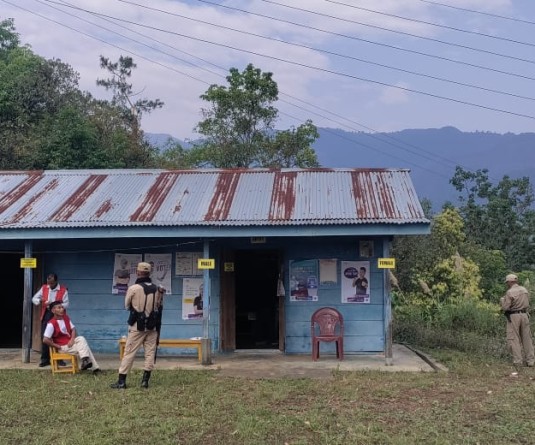
Dimapur| November 6 : Infected mosquitoes breeding in accumulated water, particularly in paddy field may cause the dreaded Japanese Encephalitis (JE), world health report has said. According to studies, an important impact on the disease burden caused by JE is due to rapid expansion of irrigated rice production. Where irrigation expands into semi-arid areas, the flooding of the fields at the start of each cropping cycle leads to an explosive build-up of the mosquito population.
More than 4000 children in Indian have lost their lives to the deadly Japanese encephalitis virus since 2007. According to the National Vector Borne Disease Programme report, Nagaland is ranked fifth among the 15 affected states. Nagaland has reported (as on October 2011), 71 cases of JE and 15 deaths since 2007. The first JE outbreak between July, 1985 and February, 1986 in Dimpaur left 50 persons affected with 30 (60 per cent) deaths.
In 2010, a massive immunization drive was carried out throughout Nagaland for children between the ages of 1to 15. Even now, the department poeriodically advises and provides vaccines for children free of cost. Apart from vaccines, the Department of Health and Family Welfare is also providing mosquito nets for protection. Other charitable private hospitals also provide free vaccines and it is advisable for children to get vaccinated.
It has been reported that JE virus is slowly moving towards Asia and South-East Asia where more and more paddy fields are expanding. But agricultiure experts have assured that there is no need to worry even though cultivation is a major occupation in Nagaland and much land is now being converted into paddy fields. “Traditional paddy fields” in Nagaland cannot breed mosquitoes, is what they said.
One of them said that in more developed countries, scientific methods of farming using fertilizers and medicines have disturbed the ecosystem. This has made the crops and the fields vulnerable to different kinds of breeding ground for diseases. But in the case of Nagaland, the ecosystem is still strong and the terrace type cultivation doesn’t allow water to remain stagnant-the perfect breeding ground for mosquitoes.
However, low-lying areas like Dimapur and Jalukie could be a cause of concern.
“We focus not only on production but also on health of plants and human,” Jacob Yanthan, an officer with the Agriculture department said. He assured that it is unlikely paddy fields in the State could be a breeding ground for the Culex mosquito. However he added, “this is something that we haven’t thought about but we most definitely should start taking measures considering the reports.”
The virus causing JE is transmitted by mosquitoes belonging to the ‘Culex ‘groups, which breed particularly in flooded rice fields. The virus, in its most deadly form, can affect the central nervous system, brain and the spinal cord and cause severe complications, even death. The only way to control JE is through vaccination.
(With agency inputs)
More than 4000 children in Indian have lost their lives to the deadly Japanese encephalitis virus since 2007. According to the National Vector Borne Disease Programme report, Nagaland is ranked fifth among the 15 affected states. Nagaland has reported (as on October 2011), 71 cases of JE and 15 deaths since 2007. The first JE outbreak between July, 1985 and February, 1986 in Dimpaur left 50 persons affected with 30 (60 per cent) deaths.
In 2010, a massive immunization drive was carried out throughout Nagaland for children between the ages of 1to 15. Even now, the department poeriodically advises and provides vaccines for children free of cost. Apart from vaccines, the Department of Health and Family Welfare is also providing mosquito nets for protection. Other charitable private hospitals also provide free vaccines and it is advisable for children to get vaccinated.
It has been reported that JE virus is slowly moving towards Asia and South-East Asia where more and more paddy fields are expanding. But agricultiure experts have assured that there is no need to worry even though cultivation is a major occupation in Nagaland and much land is now being converted into paddy fields. “Traditional paddy fields” in Nagaland cannot breed mosquitoes, is what they said.
One of them said that in more developed countries, scientific methods of farming using fertilizers and medicines have disturbed the ecosystem. This has made the crops and the fields vulnerable to different kinds of breeding ground for diseases. But in the case of Nagaland, the ecosystem is still strong and the terrace type cultivation doesn’t allow water to remain stagnant-the perfect breeding ground for mosquitoes.
However, low-lying areas like Dimapur and Jalukie could be a cause of concern.
“We focus not only on production but also on health of plants and human,” Jacob Yanthan, an officer with the Agriculture department said. He assured that it is unlikely paddy fields in the State could be a breeding ground for the Culex mosquito. However he added, “this is something that we haven’t thought about but we most definitely should start taking measures considering the reports.”
The virus causing JE is transmitted by mosquitoes belonging to the ‘Culex ‘groups, which breed particularly in flooded rice fields. The virus, in its most deadly form, can affect the central nervous system, brain and the spinal cord and cause severe complications, even death. The only way to control JE is through vaccination.
(With agency inputs)




